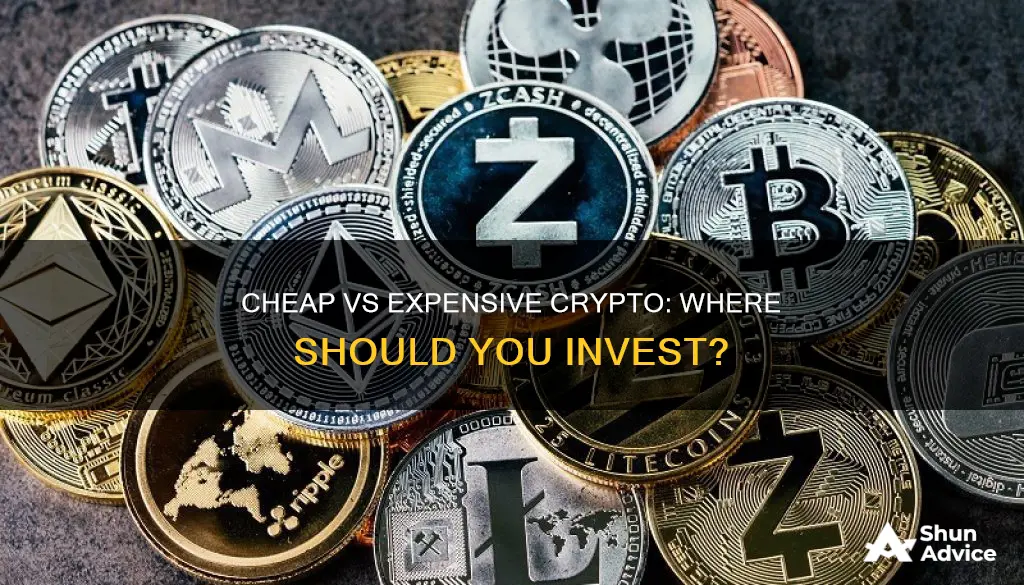
Cryptocurrency is a digital currency that can be used to buy goods and services or traded for a profit. There are thousands of different cryptocurrencies in the market, with Bitcoin being the most widely used and valuable one.
When it comes to investing in cryptocurrencies, there are two main types: cheaper alternatives and more expensive ones. Cheaper cryptocurrencies refer to digital tokens that trade for a small fraction of a dollar, allowing investors to buy thousands of tokens with a small investment. On the other hand, expensive cryptocurrencies like Bitcoin and Ethereum require a huge upfront investment to purchase just one token.
Both types of cryptocurrencies have their advantages and disadvantages. Here are some factors to consider when deciding whether to invest in cheaper or more expensive cryptocurrencies:
Cheaper Cryptocurrencies:
- Higher Token Allocation: Cheaper cryptocurrencies allow investors to acquire a larger number of tokens with a smaller investment. This is especially attractive for casual investors who may not have a large amount of capital to invest.
- Undervalued Projects: Some cheaper cryptocurrencies may be undervalued due to bear market conditions or other factors. Investing in these tokens could offer a potential upside if their value increases in the future.
- New Projects: Many cheaper cryptocurrencies are tied to brand-new projects that have recently entered the market or are still in the presale stage. Investing in these projects early on could offer the potential for significant gains if they become successful.
- Diversification: The low token price of cheaper cryptocurrencies makes it easier for investors to diversify their portfolios without needing a large budget.
More Expensive Cryptocurrencies:
- Established Projects: More expensive cryptocurrencies like Bitcoin and Ethereum have been around for a longer period and have a larger market capitalization. They tend to be more established and may be less risky compared to newer, cheaper alternatives.
- Higher Liquidity: More expensive cryptocurrencies often have higher trading volumes and liquidity, making it easier to buy or sell large amounts without significantly impacting the market price.
- Broader Acceptance: Cryptocurrencies like Bitcoin and Ethereum are widely accepted and recognized, making them more accessible for investing and spending.
Ultimately, the decision to invest in cheaper or more expensive cryptocurrencies depends on various factors, including your investment goals, risk tolerance, and the specific characteristics of each cryptocurrency. It is important to carefully research and understand the risks and potential rewards associated with any cryptocurrency before investing.
| Characteristics | Values |
|---|---|
| Price | A fraction of a dollar to tens of thousands of dollars |
| Market Capitalization | From under $10 million to over $2 trillion |
| Volatility | High |
| Supply | Limited |
| Use Cases | Payments, transmitting value, staking, governance, speculation |
| Technology | Blockchain, smart contracts, proof-of-work, proof-of-stake |
| Regulation | Unregulated but subject to increasing regulatory scrutiny |
What You'll Learn
- The pros and cons of investing in cheap cryptocurrencies
- The risks of investing in expensive cryptocurrencies
- The potential upside of investing in cheap cryptocurrencies
- The tax implications of investing in cheap vs expensive cryptocurrencies
- The long-term outlook for cheap vs expensive cryptocurrencies

The pros and cons of investing in cheap cryptocurrencies
Pros
- Cheap cryptocurrencies can be a good way to get exposure to the crypto market without spending a lot of money.
- They can be more volatile than more established coins, which means that there is potential for higher returns if the market moves in your favour.
- Some cheap cryptocurrencies may have unique features or use cases that make them attractive investments. For example, some coins may focus on privacy, while others may be designed for use in specific industries or sectors.
- They can be a good way to diversify your crypto portfolio, especially if you already have exposure to more established coins like Bitcoin and Ethereum.
Cons
- Cheap cryptocurrencies are often more speculative and risky than more established coins. They may have less liquidity, lower trading volumes, and be more susceptible to market manipulation.
- There may be less information and regulatory oversight available for cheap cryptocurrencies, making it harder to make informed investment decisions.
- Many cheap cryptocurrencies are new and have not yet stood the test of time. This means that there is a higher risk of them failing or disappearing altogether.
- It can be difficult to separate legitimate cheap cryptocurrencies from scams or pump-and-dump schemes.
- Cheap cryptocurrencies may have lower trading volumes and be less liquid than more established coins, making it harder to buy or sell large quantities without impacting the market price.
Crypto Investment Strategies: A Beginner's Guide to Crypto Investing
You may want to see also

The risks of investing in expensive cryptocurrencies
Volatility
Cryptocurrencies are highly volatile, with prices fluctuating dramatically over short periods. This volatility is often more extreme than in the stock market, and it can be challenging to predict long-term prospects.
Regulatory Risk
The regulatory landscape for cryptocurrencies is uncertain and evolving. Governments and regulatory bodies are considering how to track transactions, remove encryption protections, and regulate exchanges. These changes could affect the value of cryptocurrencies and the ease of trading them.
Cybersecurity Threats
Cryptocurrency exchanges are frequent targets of cyberattacks, and there is a risk of losing your investment if your digital wallet is hacked or if you lose your password or device.
Lack of Regulation
The lack of regulation in the cryptocurrency space means that trades are not protected by law. There are no dispute processes or ways to reverse transactions if something goes wrong.
Limited Liquidity
Some cryptocurrencies have low trading volumes, making it difficult for investors to exit their positions.
Business Risk
If a blockchain company issues a cryptocurrency, that coin will inherit the company's internal risks. For example, if the company faces financial issues due to poor capital raising or budgeting, the coin's value will likely be impacted.
Environmental Concerns
Some cryptocurrencies rely on energy-intensive mining, leading to environmental concerns and potentially negative publicity, which could affect their value.
Fraud
The cryptocurrency space is prone to scams, with billions lost to fraudulent schemes.
Unclear Valuation
The lack of concrete financial metrics in the crypto market makes valuation ambiguous, and it can be challenging to determine the long-term prospects of a cryptocurrency.
Regulatory Classification
The classification of cryptocurrencies as a currency or financial asset will impact the rules for holding, trading, creating, and taxing them. A one-size-fits-all approach may not work due to the diverse goals and features of different cryptocurrencies.
Decentralization
While decentralization reduces transaction fees and speeds up processing times, it can also lead to delays or blocks in implementing necessary changes to a blockchain network.
Market Manipulation
The extreme volatility of cryptocurrencies makes them vulnerable to market manipulation schemes.
Ameritrade: An Easy Way to Invest in Bitcoin?
You may want to see also

The potential upside of investing in cheap cryptocurrencies
Investing in cryptocurrencies is a highly speculative endeavour. While some people have made huge profits, others have lost money. It's important to do your research and understand the risks before investing. Here are some potential upsides to investing in cheap cryptocurrencies:
- Low barrier to entry: Cheap cryptocurrencies are more affordable and present a low barrier to entry for investors. With cheap cryptos, you can acquire a significant number of tokens or a substantial percentage of the total supply with a small amount of capital.
- Potential for high returns: Cryptocurrencies with small valuations and low prices per coin have a history of delivering substantial returns. As the project gains traction, more investors buy the asset, driving the value higher. These types of cryptos are associated with the potential for '10X', '100X', or even '1000X' gains.
- Early growth stage participation: Some of the cheapest cryptocurrencies are from new projects or projects in their early stages of development. Investing in a project at this stage allows you to be part of a growing community and contribute to its overall growth. As the project progresses, the value of the coin is expected to increase.
- Diversification: Investing in a variety of cheap cryptocurrencies can provide diversification to your portfolio. By spreading your investments across multiple assets, you reduce the risk associated with putting all your money into a single, more expensive cryptocurrency.
- Community and innovation: Many cheap cryptocurrencies have dedicated and active communities that contribute to the growth and development of the project. They also often embrace innovation, utilising new technologies, and exploring different use cases such as DeFi, NFTs, and metaverse applications.
- Accessibility: Cheap cryptocurrencies can make investing in crypto more accessible to those with limited funds. They allow investors to get exposure to the crypto market without having to spend a significant amount of money.
The Future of Investing: Bitcoin's Potential
You may want to see also

The tax implications of investing in cheap vs expensive cryptocurrencies
The tax implications of investing in cryptocurrencies depend on the jurisdiction in which you are based. For example, in the US, the Internal Revenue Service (IRS) treats cryptocurrencies as property for tax purposes. This means that if you sell or use your crypto in a transaction, and it is worth more than when you bought it, you will need to pay capital gains tax on the profit. Similarly, if you receive cryptocurrency as payment for goods or services, you must report it as business income. On the other hand, if you buy cryptocurrency with fiat money, you do not need to pay tax.
In India, everyone who earns over ₹2.5 lakh has to pay income tax. Cryptocurrency earnings are not exempt from this. If you have made a profit from investing in cryptocurrencies and then sold them, you will need to pay tax on this profit. However, if your investment has increased in value but you have not sold it, you do not need to pay tax yet. The longer you stay invested, the less tax you will pay due to long-term capital gains tax.
Investing in Cryptocurrency Early: A Beginner's Guide
You may want to see also

The long-term outlook for cheap vs expensive cryptocurrencies
The long-term outlook for cheap vs. expensive cryptocurrencies depends on several factors, including the specific cryptocurrency, its use cases, and the broader market conditions. Here are some considerations for the long-term outlook of cheap and expensive cryptocurrencies:
Cheap Cryptocurrencies:
- Higher Token Allocation: Cheap cryptocurrencies allow investors to acquire a large number of tokens with a small investment. For example, a $100 investment in certain cheap cryptocurrencies can yield thousands of tokens, whereas the same investment in Bitcoin would result in a fraction of a token.
- Undervalued Crypto Projects: Cheap cryptocurrencies may offer the opportunity to invest in projects that are undervalued or trading at a discount due to bear market conditions. For instance, during a bull market, a cryptocurrency like Shiba Inu can reach a high valuation, but during a bear market, its price may decline significantly, presenting a buying opportunity.
- Investing in New Projects: Cheap cryptocurrencies often represent new projects that have recently entered the market or are in the presale stage. Investing in these projects early on can provide long-term upside potential as they have smaller market capitalizations and more room for growth.
- Diversification: The low token price of cheap cryptocurrencies makes them ideal for diversification strategies. Investors can allocate their funds across multiple cheap cryptocurrencies with different use cases, reducing risk and increasing the chances of selecting a high-performing coin.
Expensive Cryptocurrencies:
- Established Track Record: Expensive cryptocurrencies like Bitcoin and Ethereum have a longer track record and are more established in the market. They have stood the test of time and have larger market capitalizations, making them less risky investments.
- Wider Adoption: Expensive cryptocurrencies tend to have a more extensive user base and broader adoption. For example, Bitcoin is widely accepted as a form of payment by many companies, and Ethereum has a vast ecosystem of decentralized applications built on its platform.
- Network Effects: Expensive cryptocurrencies benefit from network effects as their user base grows. A larger network can lead to increased transaction volumes, higher liquidity, and more development activity, further strengthening the cryptocurrency's position.
- Store of Value: Some expensive cryptocurrencies, like Bitcoin, are seen as a store of value and a hedge against inflation. This perception contributes to their long-term growth prospects and makes them attractive to investors seeking a long-term store of value.
In conclusion, both cheap and expensive cryptocurrencies offer potential opportunities for long-term investors. Cheap cryptocurrencies provide the advantage of acquiring a large number of tokens and investing in undervalued or new projects. On the other hand, expensive cryptocurrencies have the benefit of a more established track record, wider adoption, network effects, and, in some cases, a perception as a store of value. Ultimately, investors should conduct thorough research, consider their risk tolerance, and diversify their portfolios to balance the potential rewards and risks of investing in cheap and expensive cryptocurrencies.
Kraken Crypto: A Beginner's Guide to Investing
You may want to see also
Frequently asked questions
Examples of cheap cryptocurrencies include Wall Street Memes (WSM), Ripple (XRP), and Shiba Inu (SHIB).
Bitcoin (BTC) and Ethereum (ETH) are two of the most expensive cryptocurrencies.
Cheap cryptocurrencies allow investors to buy a large number of tokens with a small investment. They also enable investors to buy tokens at undervalued prices and provide an opportunity to invest in new projects from the ground up.
Cheap cryptocurrencies may be untested and have a small market capitalization, which can make them riskier investments. There is also no guarantee that a cheap cryptocurrency will gain in value or become widely adopted.







